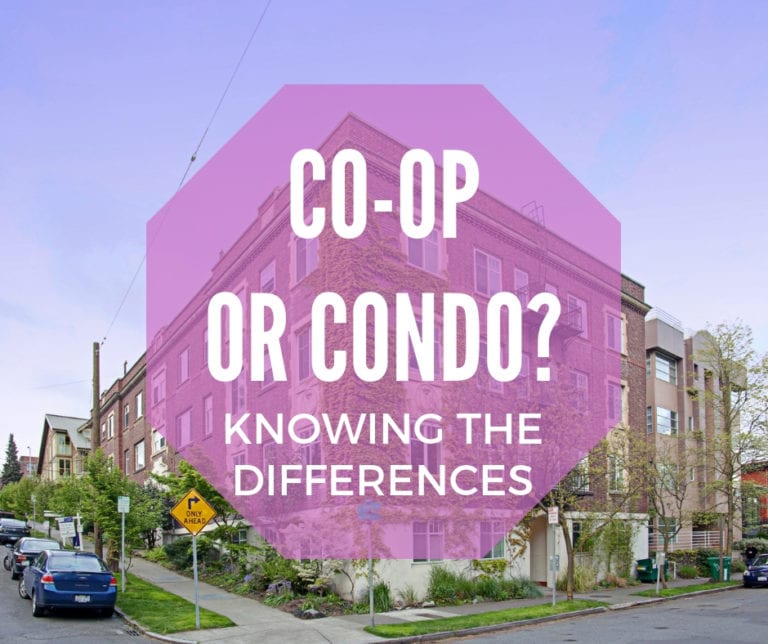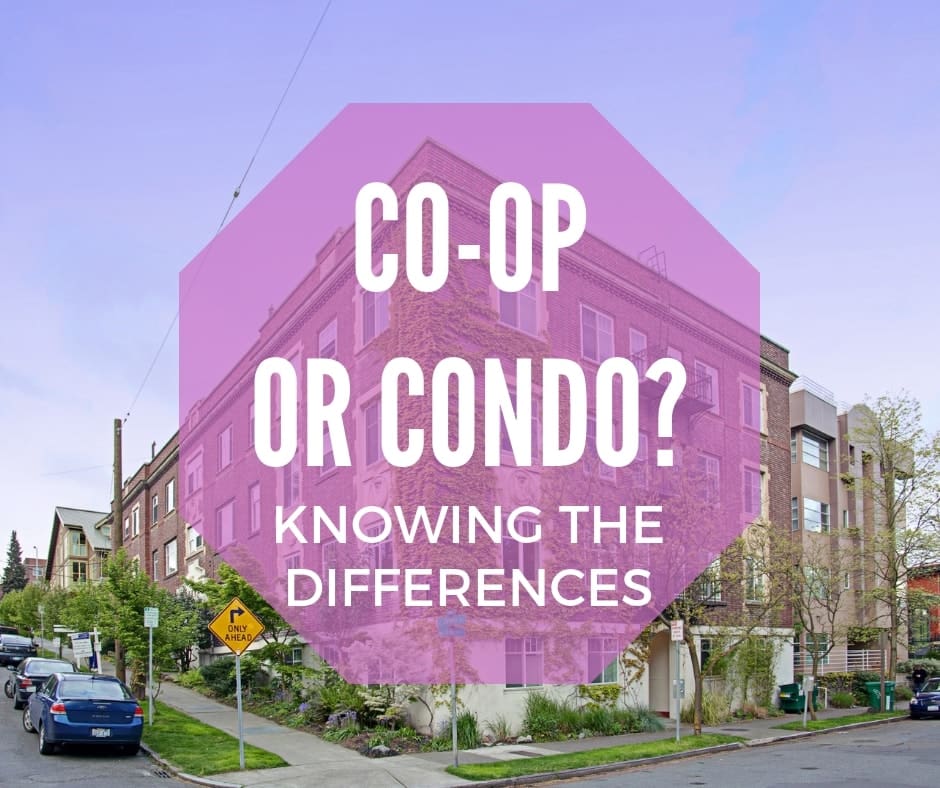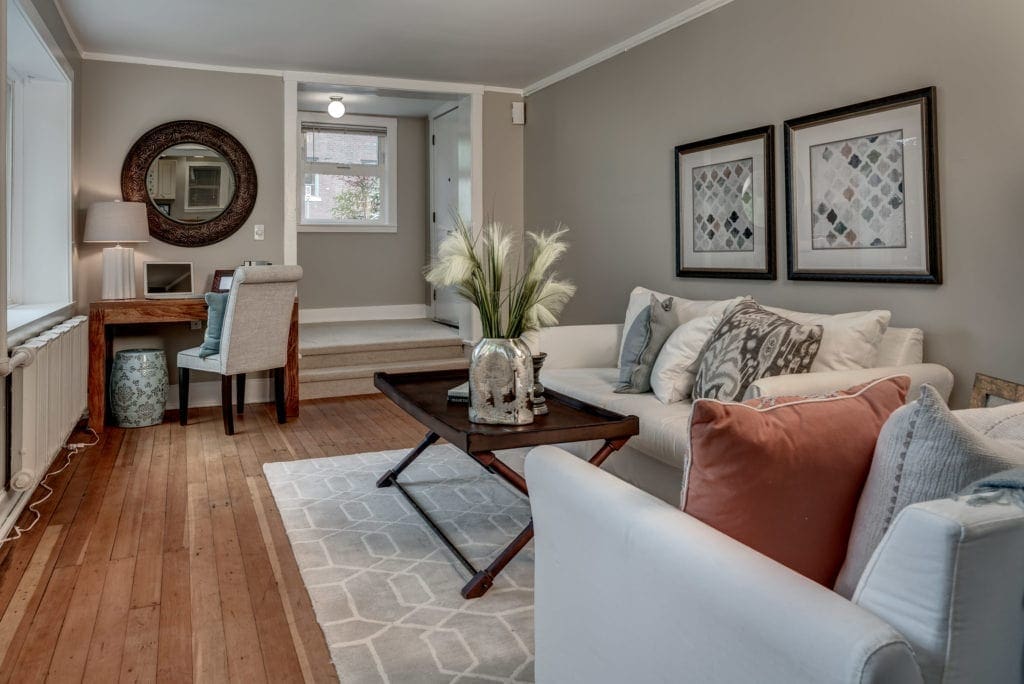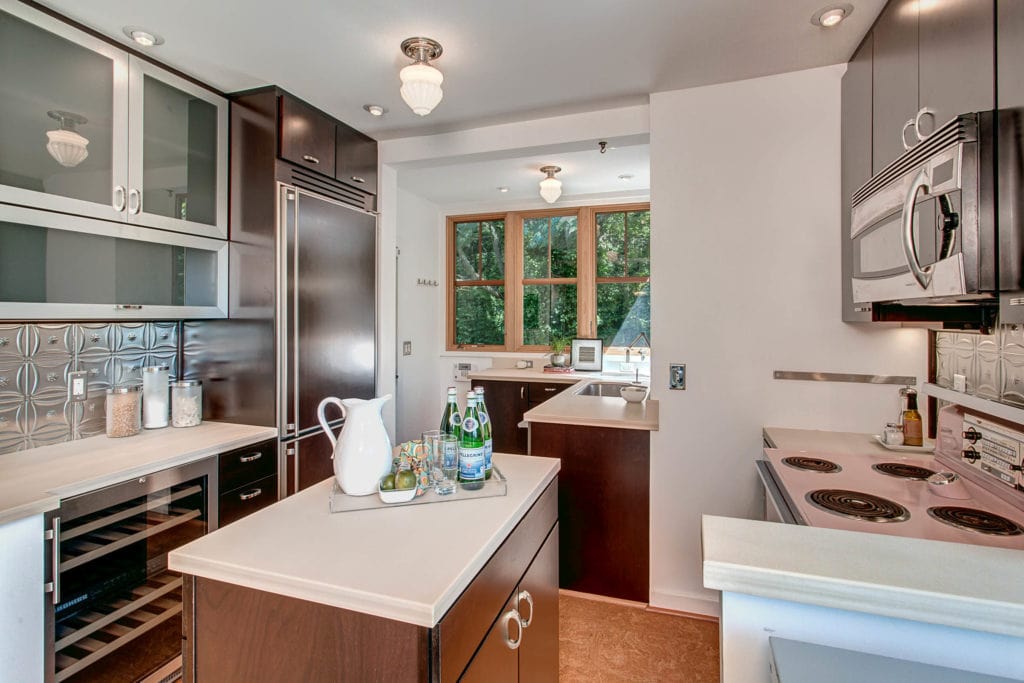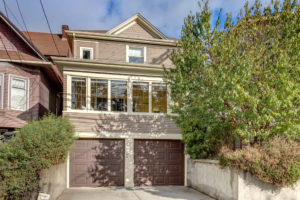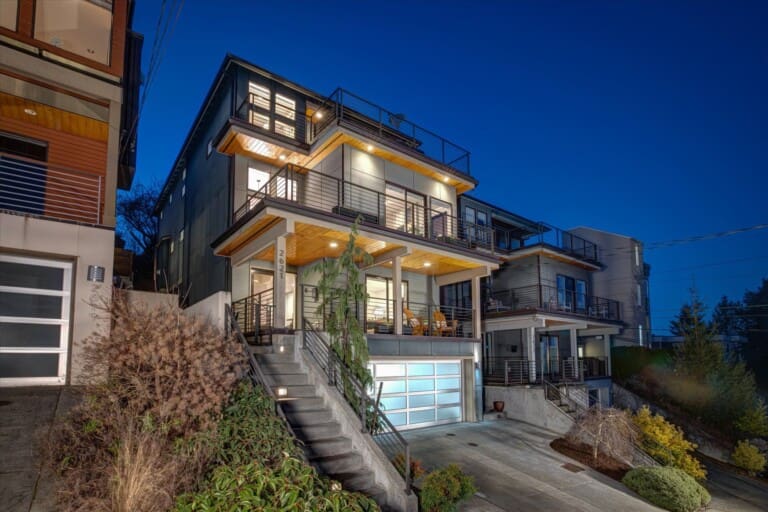There’s a sentiment we hear repeated among first-time home buyers: “Condos and co-ops are both units in a larger building. How different can they be?” They are often surprised by the answer to that if they haven’t done the research. In fact, co-ops can take a lot of forms, from senior and student housing to mobile home parks and single-family homes.
What separates condos and co-ops is actually the legal structure of ownership. It just happens that a lot of co-ops are in older multi-family buildings here in Seattle.
In some cities, co-ops greatly outnumber condos. In New York City, if you want a cute home in a pre-war building, you’re almost certainly looking for a co-op, not a condo. Most co-ops in Seattle were established before the big building booms, so they still have vintage charm and are harder to find.
There are some overlaps between condos and co-ops, but when it comes to the all-important transaction, they are very different. Here are some comparisons:
What You Actually Buy, Own and Sell in a Condo vs Co-op
Condos: Condos are real property, just like a detached home. You have an actual deed for the condo. You sell the property just as you would a house, too.
Co-ops: A co-op exists legally as a corporation, and residents own shares in that corporation, like an investor. You are not the outright owner of a real property, but your shares entitle you to a proprietary lease. Usually, the more shares you have in the corporation, the larger the apartment. When you sell your shares, the lease is transferred to the buyer.
Financing a Condo Vs a Co-Op
Condos: Majority of the lenders will lend on a co-op as long as it meets Fannie Mae requirements for owner occupancy, reserves, lawsuits, etc.. You can put down as little as 0% down if you are a Veteran and buying in a VA Approved Condo building. Majority of Seattle buidlings are not VA or FHA approved.
Co-Op: Most lenders say they will lend on a co-op but they are lying to you. What they are actually doing is doing the loan as a broker to the National Co-Op Bank. As a result, they have less flexibility in the products they can offer and you have to put down 20% for the loan on the home.
The bottom line is that there are two lenders that we would recommend. Locally, Caliber will lend on a limited number of co-0p buildings in Seattle. Lately, we have been sending our clients to the National Co-Op Bank (NCB), who are the primary lenders for co-ops in the nation. You can put down as low as 5% for a co-op using NCB.
Lending changes all of the time. Team Diva is on top of the shifting market and the needs for every building. Let us know if you have questions and we can help.
Selling a Condo Vs. Selling Shares in a Co-op
Condos: There’s a deed, so the transaction is between buyer and seller with a condo. Of course, there is almost always a lender, too,
Co-ops: The transaction includes the buyer, seller, lender (unless you have cash)…and the board! Because all the owners are in it together, they can have a say in who buys into their building. Some co-ops have become super uptight and are starting to include down-payment expectations for new buyers. But the bulk of the co-ops are old school, and the approval is a formality.
Note: When you sell your co-op, you are selling shares, so you do not pay an excise tax as you would with real property. Nice!
Homeowner Taxes and Homeowner Dues in a Condo vs Co-op
Condos: Because the homeowners in a condo building each have an actual deed, they each receive a separate tax bill from the city. On top of this, they pay maintenance and upkeep charges for the building (e.g. heat, hot water, insurance, staff salaries if there is a concierge).
Co-ops: As shareholders, the taxes for co-op residents are paid by the corporation. These get rolled into the monthly maintenance fees and building expenses. This is why monthly dues for co-ops can be slightly higher than they are at standard condos. Do not worry. The homeowner taxes are divided between the units based on the number of shares you have, so you can still write them off in your taxes.
Community in Condo vs Co-op
Condos: Everyone is their own homeowner in a condo. People might find some community as neighbors in common areas or activities, but people tend to be more independent and private in condos. Condos have more renters or owners who are more transient.
Co-ops: Everyone’s in it together. Owners also stay in the building for longer. Hence, co-op communities tend to be much more tightly knit and involved with each other. Because they can determine who gets to buy in the building, co-ops can have very distinct cultures in how they operate. There are some great ones and some dysfunctional ones. It’s important to know before you buy what you are getting into, for better or worse.
That brings us to one last comparison…
Roommates/Subletting/Renting in a Condo vs Co-op
Condos: Every building has its own rules, but with condos (because you own the property) renting out your home is not an issue as long as there is not a rental cap.
Co-ops: Having roommates is typical to fine with most co-ops. Play nice and sweet talk your board member. However, many co-ops are owner-occupied ONLY. And if you are lucky enough to live in a renter friendly building the renter ALSO has to be approved by the board. This is why large investments firms and individual investors will scoop up condos, but tend to avoid co-ops.
Pet Requirements in a Condo vs Co-Op
Condos: Majority of condos allows dogs and cats. Typically there is a limit of two animals below 40 pounds. Every building is different but this seems to be a universal standard.
Co-ops: For some reason, the bulk of co-ops are cats only buildings in Seattle. And there is one co-op building in the UDistrict that has a strict no pet policy. Change is coming to many of these building. Slowly. But it takes time to make big changes with such an insulated community.
Let’s Talk More About the Board Approval Process
Now you know the fundamental differences between condos and co-ops. The next question is: If co-ops are the exception, what do I need to know specifically about buying a co-op? The good news is that, other than the extra steps required of the board, the transaction runs more or less the same as buying a condo.
It is worth emphasizing again that you’ll need to get to know and get along with the current shareholders/residents of a co-op. The approval process can require interviews, background checks, and details about your loan financing. This can all happen even after getting approval for a mortgage from the bank. That can be a frustrating delay for buyers and sellers, so establishing a good rapport and knowing expectations in advance is important.
Quick Checklist For A Quick Board Approval
- Introductions – The boards will introduce themselves to you and give you a feel for what the community is like to be around.
- Possible Questions: How long do you plan on living here? Do you work well with others? How can you contribute to the community?
- Have Your Finances Prepped – Most of the associations will not ask for your financial records. They do want to confirm that you are capable of making your payments, paying your dues, and not being a financial burden to their small community. Most of the budgets are managed to the penny. Any one person not paying their dues has a huge impact on the larger community.
- Mistakes and Criminal Convictions – We all have things we wish had not happened to us and mistakes that we have made. Mistakes happen. And frankly, it is what happens to your life after that counts. Be upfront with anything that the board can find out through public records or by doing a background check. And explain that you have improved your life.
- Be Ready To Accept Community Volunteer Activities – The communities in these buildings are typically self-managed. You will need to serve on a committee and/or the board at some point as an owner. And frankly, it is your building. You are a shareholder. So don’t be a slacker!
- Have Questions Prepped for the Board – What is it like to live here? What are the volunteer activities expected of an individual? What are the biggest challenges you are facing as a board member? What are the next group of projects planned for the building?
Final Thoughts: Are You Right for a Co-Op?
Ultimately, deciding between a condo or co-op comes down to how much you love the home AND what kind of person you are. Some thoughts:
If you like being involved in the decision making about your building, being in a co-op is beneficial. If you want to trust someone else to handle those things so you can be more independent, a condo is a better fit.
Do you intend to use your property as a long-term rental investment? Go with a condo. Do you intend to live in your own home and for a community? Consider a co-op.
Don’t mind having less fancy common areas and amenities? Co-op. Need that 24-hour concierge and sparkling fitness center and don’t mind paying for it? Luxury condo.
Every home and situation is different, but with these comparisons, we hope you can be better informed about co-ops, their pros and cons, and make more informed choices as you search for your next home in Seattle’s hot real estate market.


